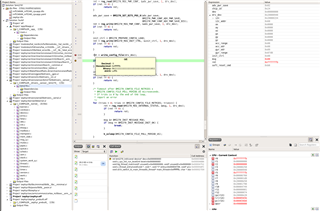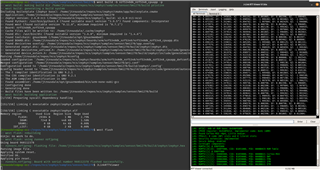I am attempting to get the BMI270 sample working on an nRF5340DK, using nRF Connect SDK v1.6.0, but all attempts at device_get_binding("BMI270"), device_get_binding(DT_LABEL(DT_INST(0, bosch_bmi270))), and similar return null. I am using the following config and overlay files
#prj.conf CONFIG_UART_CONSOLE=n CONFIG_USE_SEGGER_RTT=y CONFIG_RTT_CONSOLE=y CONFIG_I2C=y CONFIG_SENSOR=y CONFIG_BMI270=y
/* nrf5340dk_nrf5340_cpuapp.overlay - no shield */
&arduino_i2c {
status = "okay";
bmi270@68 {
compatible = "bosch,bmi270";
reg = <0x68>;
label = "BMI270";
};
};
On the hardware side I'm using a BMI270 breakout connecting SDA to P1.02 and SCL to P1.03.
I have also used a shield that sends SDA to P0.25 and SCL to P0.26, with the following overlay
/* nrf5340dk_nrf5340_cpuapp.overlay - with shield */
&i2c1 {
sda-pin = <25>;
scl-pin = <26>;
};
&arduino_i2c {
status = "okay";
bmi270@68 {
compatible = "bosch,bmi270";
reg = <0x68>;
label = "BMI270";
};
};
In all attempted cases
#include <zephyr.h>
#include <device.h>
#include <drivers/sensor.h>
#include <stdio.h>
void main(void)
{
const struct device *dev;
dev = device_get_binding("BMI270");
if (dev == NULL) {
printf("Could not get %s device\n",
DT_LABEL(DT_INST(0, bosch_bmi270)));
return;
}
...
}
gives the output
00> *** Booting Zephyr OS build v2.6.0-rc1-ncs1 *** 00> Could not get BMI270 device
in J-Link RTT Viewer.
Any help would be greatly appreciated.



